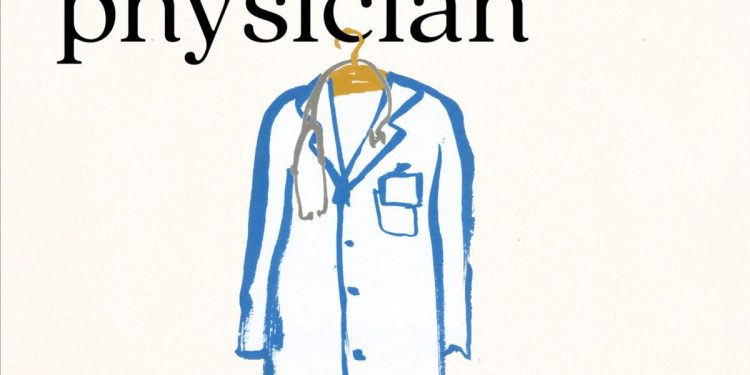Excerpted from “Letter to a Young Female Physician: Notes from a Medical Life” by Suzanne Koven, associate professor, Harvard Medical School, and primary care physician and writer in residence, Massachusetts General Hospital.
I knocked shyly on the open door of Albert Blake’s hospital room. All I knew about him was that he was 54 years old and that he had leukemia. As I watched him doze for a few long seconds before knocking again more firmly, I took in his gaunt, ashen face and withered arms and observed that Mr. Blake, as we’d been taught to record in our notes, “appeared older than his stated age.” He opened his eyes, smiled, and nodded toward the chair beside his bed, inviting me to sit down. Suddenly he seemed younger, healthier. I felt as if I were looking at one of those holograms where two images alternate, one shifting into the next, in Mr. Blake’s case: sick/well, patient/person.
I’d been assigned to interview Mr. Blake in the spring of my first year of medical school at Johns Hopkins during a course called Clinical Skills. A few weeks earlier my classmates and I sat excitedly in a lecture hall and each received, courtesy of a pharmaceutical company, a starched white coat and a monogrammed black leather doctor’s bag equipped with an otoscope, an ophthalmoscope, a stethoscope, and a reflex hammer. Once a week we’d put on the coats and carried the bags to the hospital to meet, in groups of four or five, an instructor who taught us how to record patients’ histories and how to use our tools. We walked through the hospital corridors on the way to these sessions hoping that we wouldn’t be mistaken for doctors — and also hoping that we would.
“We walked through the hospital corridors on the way to these sessions hoping that we wouldn’t be mistaken for doctors — and also hoping that we would.”
Long before deciding on a medical career, years before I wanted to be a journalist, I’d aspired to be an actor and my new costume and props made me feel as if I were onstage, a sensation reinforced by the scripts I’d newly memorized, long lists of questions we were supposed to ask our patients: Did they have headaches, double vision, ear pain, bloody noses? Had they been exposed to exotic birds or eaten unpasteurized cheese? Did they have chest pain, and did the pain occur when they took a deep breath, or when they ate or walked? So many questions, all of them as abstract to us as philosophy since we did not yet know which diseases could be transmitted by birds or cheese, or what the symptoms we elicited meant, much less how to treat them.
In the following three years, when we knew more, patients would be chosen for us to interview and examine based on whether they had interesting diseases or dramatic findings on their physical exams. We’d be sent to see the patient with sarcoidosis; listen to the chest of the woman with rhonchi, rattling breath sounds so loud even a novice couldn’t miss her pneumonia; introduce ourselves to the man with Wernicke’s encephalopathy, in which chronic heavy alcohol consumption obliterates short-term memory, then we’d wait five minutes, return to the room, and introduce ourselves again to the patient who would, in that short interval, have forgotten meeting us entirely. In Clinical Skills, though, patients were selected for being … patient. Those who agreed to have medical students practice on them might have dozens troop by to ask the same questions again and again. What brought you into the hospital? When did this symptom begin? Have you ever had anything like this before? What brought you into the hospital? What makes it better or worse? What brought you into the hospital?
Mr. Blake was patient. He was also a natural raconteur who said he didn’t mind passing the hours during his tedious hospitalizations by chatting with students. He’d told his story many, many times. Still, when my turn came to settle into the chair by his bed with my clipboard, Mr. Blake did not stint. What had brought him into the hospital? Well, he said, leaning back on his pillows and drawing a leisurely breath, it was like this: One afternoon about a year earlier he was coaching his 10-year-old grandson’s baseball team. He’d been spending more time with the boy since his mother, Mr. Blake’s daughter, had gotten involved with drugs and acquired a boyfriend who was, in Mr. Blake’s opinion, a stone-cold loser. Anyway, there he was, standing behind home plate, urging one of the kids to keep his eye on the ball, when suddenly he’d felt light-headed. He held on to the chain-link fence to keep from falling and as he looked at his fingers, wrapped tightly through the metal wire, he noticed how pale they were.
And on Mr. Blake went, through the arrival of the ambulance, his grandson running in crying from left field, the first and the second and the third rounds of chemo during which his wife held everyone up as she always had, including the Blakes’ daughter, who, not long after the onset of her father’s illness, had ditched the drugs and the boyfriend and would be coming by to visit shortly with his favorite cookies, though he doubted he’d have enough appetite to eat them.
I transcribed all of this information and a few days later, after my instructor had approved my report, tucked it away for sentimental reasons only, thinking I’d be unlikely ever to look at it again.
Some months afterward, though, I dug through my desk drawers looking for my note about Mr. Blake. I was now at the end of my second year and rotating on the oncology ward, where he had again been admitted. I asked if I might be assigned to help take care of him. Mr. Blake didn’t remember me, and he was sicker than when I’d last seen him, but he greeted me as he had before with a warm smile and an encouraging wave. And he again tolerated my history taking, which remained plodding, though was somewhat more efficient now that I had a better idea of what to ask and so could spare him my slavish recitation of all the questions I’d committed to memory. I asked Mr. Blake how he was feeling, got an update on his treatment, which was not going well, and left the room to copy down his medications, allergies, test results, and other data at the nurses’ station. As a new clinical student, I wasn’t expected to finish my note before leaving for the day and considered myself lucky to have waiting at home a thorough account of the onset of Mr. Blake’s illness that I could easily add to what I’d just recorded.
Tucked into a folder containing papers I’d written in college, I found it. My florid descriptions of Mr. Blake’s pale fingers clutching the chain-link fence, his grandson’s tears, the addicted daughter and her loser boyfriend made me cringe. None of that was important. All that counted now were Mr. Blake’s daily fever charts and lab values, his IV fluids and urine output, his chemotherapy regimen. These were matters of life and death, unlike his story, which, however engagingly Mr. Blake had shared it with me, was irrelevant to his current medical care. I tossed my old note back in the folder with my essays on “Bleak House” and “Mrs. Dalloway,” having concluded that it was, like they were, useless. Then I wrote my new note as if I’d never met Mr. Blake before, as if I’d never heard his story.
Copyright 2021 by Suzanne Koven. Used with permission of the publisher, W.W. Norton & Company, Inc. All rights reserved.














